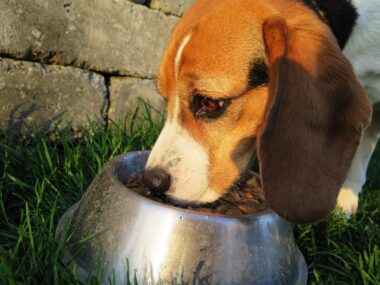How Veterinarians Use Hydrolyzed Protein Diets to Treat Allergic Dogs
Understanding allergic reactions in dogs often begins with identifying the triggers. Many allergies stem from proteins in commercial dog foods, which can lead to adverse reactions. That’s where hydrolyzed protein diets come in; they are specifically formulated to prevent these allergic responses from certain protein sources. This dietary approach involves breaking down these proteins into smaller, non-allergenic molecules. By doing this, the immune system recognizes these hydrolyzed proteins as safe, minimizing the allergic responses. When considering such diets, consult your veterinarian to ensure it’s suitable for your dog’s needs. Hydrolyzed protein diets may help alleviate symptoms, such as itching, hot spots, or gastrointestinal discomfort. This diet could serve as a vital tool in managing food allergies. Researchers have noted significant improvements in dogs that transitioned to these specialized diets. Successful implementation requires commitment, as an elimination phase often precedes the identification of allergens. Your vet will help guide this process, emphasizing monitoring your dog’s response to the diet. They might also suggest transitioning slowly to avoid any complications while managing your pet’s overall health.
Hydrolyzed protein diets are available in various forms, including dry kibble and wet food, allowing flexibility in catering to food preferences. The ingredients are typically sourced from high-quality proteins like fish or chicken, chosen for their digestibility. This dietary shift typically requires a transition period; however, it is crucial to adhere to your veterinarian’s guidance during this time. As your dog gradually adapts to the new food, observe any changes in their health and behavior. Weight management is also critical during this phase to prevent obesity. If your dog shows signs of improvement, such as reduced itching or a healthier coat, it may indicate success with this dietary strategy. Regular check-ins with the veterinarian can provide valuable insights into your dog’s progress while following the hydrolyzed protein diet. Staying informed about the nutritional properties of your dog’s food can empower you, enhancing the bond between you and your dog. Keep a close eye on any changes, and do not hesitate to reach out to your veterinarian with any concerns, especially during the transition.
Identifying Food Allergies
Accurate identification of food allergies in dogs is essential for implementing effective treatment. Many pet owners may initially misattribute symptoms like itching or vomiting to other causes, leading to delayed diagnosis. To confirm a food allergy, veterinarians typically recommend an elimination diet. This process requires removing all potential allergens and introducing new foods one at a time. Hydrolyzed protein diets serve a vital role in this process. They allow dogs to consume a diet with minimal allergenic potential while undergoing testing. The process can be time-consuming and requires patience from pet owners, as it may take several weeks before seeing improvements. Keep a journal to document your dog’s symptoms and any dietary changes, as this can help identify correlations more clearly. Undergoing such assessments in tandem with proper veterinary advice ensures your furry friend receives optimal care. This targeted approach not only alleviates immediate symptoms but also enhances their overall quality of life. With the right dietary plan, both you and your veterinarian can work together toward identifying the specific allergens affecting your dog.
Supportive care and communication with your veterinarian can significantly facilitate the process. Hydrolyzed protein diets often require strict adherence to prevent accidental exposure to allergens. Many pet owners find it beneficial to prepare meals at home, using fresh ingredients approved by their veterinarians. By doing so, you can further control the diet’s composition while ensuring it meets your dog’s nutritional needs. Additionally, gradual reintroduction of previous protein sources allows for meticulous monitoring of food reactions. If reactions occur, it may indicate specific allergens, leading to more personalized dietary recommendations. Dogs suffering from various food allergies may experience long-term benefits from this method, leading to improved health and vitality. Choosing a hydrolyzed diet is merely the first step; regular monitoring and assessments will ensure a suitable and potentially life-changing dietary program. Maintaining open lines of communication with your veterinarian allows for necessary adjustments along the way. Every dog reacts differently, highlighting the importance of customizing nutritional plans to each dog’s unique situation. Strive for a holistic approach, encompassing both diet and overall wellness for optimal results.
Potential Benefits of Hydrolyzed Protein Diets
Hydrolyzed protein diets offer multiple benefits for dogs suffering from food allergies and intolerances. Firstly, these diets are highly digestible, minimizing gastrointestinal stress that could cause discomfort. Many pet owners report an improvement in their dog’s energy levels and overall demeanor. A reduction in scratching or skin irritations also presents an immediate benefit, improving your dog’s quality of life significantly. Additionally, switching to a specialized hydrolyzed diet could lead to weight management improvements, as the food often carries lower fat content. Furthermore, many commercial brands of hydrolyzed protein dog foods have been carefully formulated to meet the strong nutritional needs of dogs. This ensures complete nutrient absorption, necessary for your dog’s energy and overall health. For pet owners, a well-balanced diet can alleviate concern about nutrient deficiencies. Regular veterinary check-ups will ensure that your dog is thriving on this new diet. Attention to detail is paramount, as monitoring breeds understanding between the vet and pet owner, facilitating a proactive approach to your dog’s health. All these factors contribute to the holistic benefits of hydrolyzed protein diets in managing dog food allergies.
Veterinarians may also recommend specific dietary strategies alongside hydrolyzed protein diets. Sometimes, incorporating novel carbohydrates or fiber additives can aid in overall digestion. This is particularly beneficial for dogs prone to gastrointestinal upset, which often accompanies food allergies. Similarly, restricting treats during the onset of the new diet helps ensure your dog does not inadvertently consume allergens. Remember that successful management of food allergies involves a collaborative effort between you and your veterinarian. Educating yourself about suitable foods vastly improves your success chances. Expect initial challenges as your dog transitions; however, ongoing communication with your veterinarian can smooth the process considerably. Considerations on flavor or texture may play a role in your pet’s acceptance of the new diet. Ensuring a positive eating experience encourages compliance and reduces stress. With patience and persistence, many dogs adapt well to these specialized diets. Some owners find a gradual change from the old food to the new hydrolyzed diet particularly effective. Approach this dietary journey with commitment, as it can lead to lasting improvements in your dog’s overall health and happiness.
Monitoring and Adjusting the Diet
Once you’ve initiated the hydrolyzed protein diet for your allergic dog, monitoring their condition becomes essential. Regular check-ins with your veterinarian allow for adjustments based on your dog’s response to the new diet. This might involve periodic evaluations of their symptoms and health markers to assess effectiveness. Many dog owners successfully track their pet’s progress through detailed notes or charts, reflecting changes in behavior, appetite, and overall physical condition. Keeping tabs on your dog’s weight should also be a priority during this period, as weight fluctuations could indicate underlying issues. Based on these observations, your veterinarian may recommend further dietary adjustments, such as alterations in protein sources or caloric intake. Remember that even subtle changes in your dog’s condition warrant a conversation with your vet; they can identify potential issues before they escalate. Hydrolyzed protein diets are often beneficial, but each dog can react uniquely. Frequent communication and updated assessments enhance the chance of long-term success. Be prepared for fine-tuning as an ongoing part of dietary management. This commitment paves the way to a healthier, happier life for your furry friend.
In conclusion, hydrolyzed protein diets play a significant role in the management of food allergies in dogs. Their effectiveness in minimizing allergic reactions proves invaluable for both pets and their owners. Understanding your dog’s specific needs and working closely with your veterinarian maximizes the potential benefits of these specialized diets. A well-structured approach involving monitoring, nutrition education, and gradual adjustments fosters success. By investing time and effort into understanding these dietary options, you empower yourself to make informed decisions about your dog’s health. This not only aids in immediate relief from allergic symptoms but also enhances the long-term health and vitality of your pet. Ultimately, a multi-faceted strategy incorporating various support measures alongside the hydrolyzed protein diet maximizes the welfare of dogs with allergies. With care and diligence, many dogs will thrive on these diets, experiencing improved health and happiness. Furthermore, this journey serves as a testament to the bond shared between you and your furry companion. A concerted effort toward dietary management brings peace of mind, knowing you are providing the best care possible for your canine friend.





